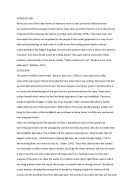to convey the innate feelings of the poet and this poem exactly does the same. Owen was a
soldier himself which means he had first-hand experience of war and battlefield. The poem
brings to light the struggle a soldier has to go through in their everyday life which is hardly
talked about by any of the poets (Benz, 2018). Most of the poets glorified being a soldier and
dying for the country in the battlefield was portrayed as being heroic in all the war poems and
even the government.
Owen was writing exactly the opposite of what is preached by most of the people and
even the government and the propaganda and lies that they preached, who did not really enter
the battlefield like Owen. The condition of the soldiers is described as, “Bent double, like old
beggars under sacks, / Knock-kneed, coughing like hags, we cursed through sludge, / Till on
the haunting flares we turned our backs.” (Owen, 1995). These lines clearly show the soldiers
in a miserable condition rather than as heroes. By doing this Owen performs the duty of a poet.
A poet is not the one who writes about all things sweet in a rhythmical way, but the main
purpose of the poet is to show the reality of a situation and bring to light those aspects which
are being pushed under the rug by the society or covered under a shining armour. The duty of
a poet involves changing the perspective of people by bringing to light the situation of the
society and the problems that have been glaring at the society to be solved but they are not even
acknowledged. A poet is not supposed to turn a blind eye to the issues prevailing in the society
and right about the scenic beauty when an entire population is suffering due to the societal
problems like racism that has been plaguing the society. Alan Paton does exactly that and writes
about the racial tension in the society that existed within the society that surrounded him during
the late 1940’s.
In his article the poet clearly demonstrates the fear that was held by the people
especially due to their cultural and racial difference. The poet was writing at a time when people
were identified based on their race and skin colour rather than any other factors like their
contribution to the country. The poet serves the purpose of writing the poetry which is to bring
to the surface the exact feeling of the poet and presenting it in a compact and acceptable
language to the public. The poet actually criticizes Christian principles and the way in which it
tends to peddle and impose the stereotypes with respect to different race and he also shows his
disgust at the cultural narrow-mindedness which seems to work as a major hurdle in keeping
the people together and rather its facilities the separate development of country and even
community. This poem was written when division was taking place with respect to the South
Africans and the poet effectively channels his understanding of what the people were going
through not just physically but even mentally as they had to face an emotional turmoil which
was unavoidable.
CONCLUSION
It can be safely concluded that both the writer Wilfred Owen and Alan Paton serve their
responsibilities as a writer. The main purpose of the poem is to bring to the surface what the
poets are feeling ad present it to the readers in a way that they understand the entire thing and
not just that but also present in a compact manner which is done by both the authors. The poets
are supposed to be writing about the complexities and issues of the society rather than turning
a blind eye to it. As Owen used accurate word choice and structured the poem well to show his
point of view and to show people the truth about the suffering of soldiers.
REFERENCES
Benz, S., 2018. The Poet as Rhetor: A Reading of Wilfred Owen's “Dulce et Decorum
Est”. Journal of Modern Literature, 41(3), pp.1-17.
Horálek, K., 2019. Folk poetry: history and typology. In Current Trends in Linguistics (pp.
741-808). De Gruyter Mouton.
Malaba, M., 2015. " Could you not write otherwise?" The political dimension of Alan Paton's
poetry. Koers: Bulletin for Christian Scholarship= Koers: Bulletin vir Christelike
Wetenskap, 80(2), pp.1-7.
Owen, W., 1995. Dulce et decorum est (p. 166). na








